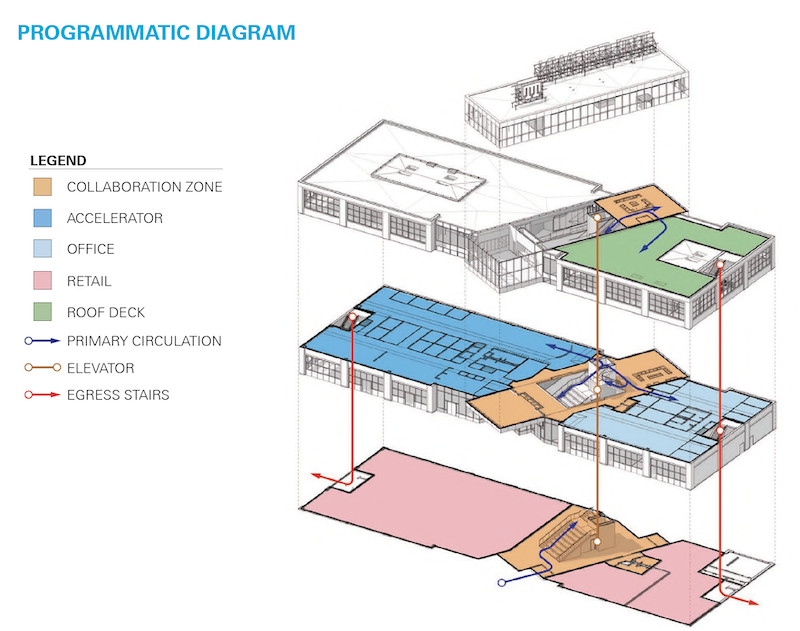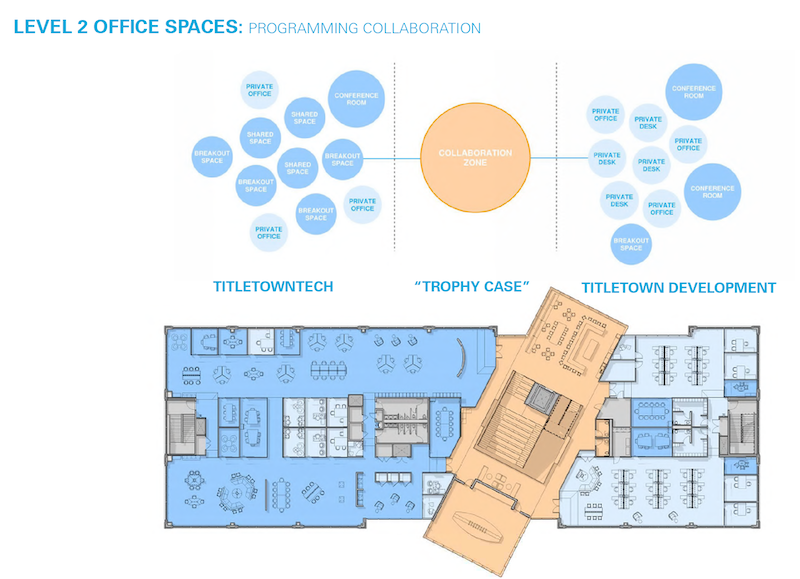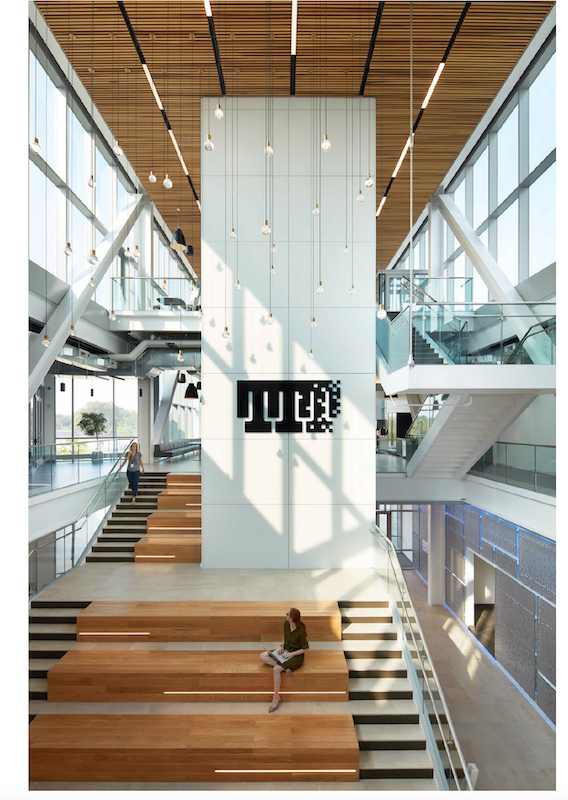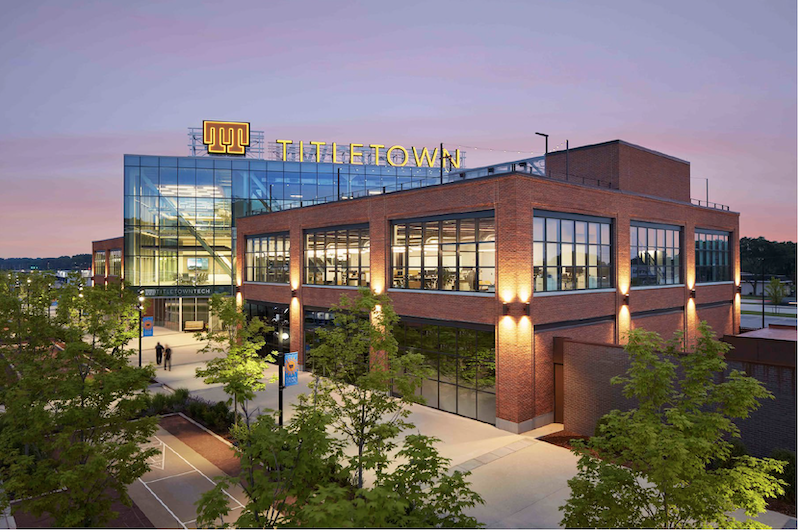Football is often described as game of strategy. So perhaps it wasn’t surprising that the Green Bay Packers, through a joint venture between the team’s development arm and Microsoft, recently opened TitletownTech, a 50,000-sf innovation center in Green Bay, Wis., that is set up to cultivate and provide financial support to high-growth startup companies.
SGA, the architect on this project, has created a three-level “stage on which innovation and collaboration can flourish,” states Brooks Slocum, the firm’s New York Studio Manager. He elaborates that the building’s design applies “spatial strategies” that “maximize” proximity, flexibility and spontaneity.
The design reflects Wisconsin’s old mill buildings, showcasing brick, steel, and wood. Those features are juxtaposed with high-tech glass and state-of-the-art materials.

TitletownTech is designed and organized into three levels that promote user collaboration and interaction. The second floor is devoted mainly to office space.

Three components drive TitletownTech, which actually has been operational since last summer but had its grand opening on October 18:
•An innovation lab, focused on creating new ventures: where entrepreneurs and established regional businesses can engage to develop ideas, explore disruptive new business models and next-generation technology solutions. The first floor includes flexible seating reminiscent of stadium bleachers. Informal lounges and social spaces are interspersed throughout the building. “Hot spots” allow guests to congregate for impromptu meetings. And “sandbox” spaces are equipped with oversized writable magnetic walls to help users flesh out ideas and discussions.
•A venture studio, focused on building ventures: where new and emerging business models and scalable industry solutions are developed into stand-alone startup ventures. Microsoft will have employees based at TitletownTech, including a Technologist in Residence, who can be resources for entrepreneurs. Microsoft’s TechSpark initiative—a civic program created to focus on communities in six states that include Wisconsin—will also have a representative on site. (Microsoft’s agenda at TitletownTech includes its goal to eliminate the rural broadband gap for millions of Americans.)
•A venture fund, focused on funding and investing in high-growth startups aligned with industries in Northeastern Wisconsin that will bring opportunity to the region. As of last October, the venture fund had $25 million, and its limited partners include AmeriLux International, Baird, Cornerstone Foundation of Northeastern Wisconsin, Dickman Ventures, Green Bay Packaging, N.E.W. Venture Foundry, Plexus, Schreiber, Schneider, Sartori Cheese, The Village Companies and Weyers Investments, Delaware North, New York Mets and Sterling Project Development.

The first floor of an expansive atrium features flexible seating that suggest stadium bleachers, and encourages people to interact as that move from level to level.
TitletownTech is integrated into the Packers’ 45-acre Titletown District, located west of the team’s Lambeau Field stadium. The District’s 20-acre first phase, completed in 2017, includes a hotel, retail, restaurants, and sports medicine center. Phase 2, whose construction began last June, focuses on residential and commercial buildings, including at least 54 townhouses under constuction, as well as a five-story office building, and 152-unit apartment building. So far, the Packers have invested $170 million in its Titletown District.
“Northeastern Wisconsin has a burgeoning entrepreneurial ecosystem, and we felt Titletown would be a perfect place to further spur economic expansion in the region and beyond by bringing world-class digital innovations and expertise to Greater Green Bay,” explains Aaron Popkey, a spokesman for the Green Bay Packers. He goes on to say that TitletownTech will serve as a creative center where digital solutions are developed for key market challenges.
TitletownTech is already working with a handful of companies that include Oculogica, a digital healthcare firm that has developed the EyeBOX, the first FDA-approved neuro-diagnostic device that uses proprietary and innovative technology to track eye novement to determine if a person has a concussion (a tool that might benefit the football team directly).
Through BIM coordination, SGA and Miron Construction, TitletownTech’s CM, reduced the innovation center’s construction costs by between 1.5% and 3%. Utilizing Enscape software’s real-time rendering capabilities, SGA’s models represented the actual materials, design intent, specifications, detailing, and coordination. The models helped to identify, for example, that structural beam openings were too small, and that a large fan in the building’s atrium needed a framing system and mounting points.
Preconstruction visualization for the innovation center, offices, and boardroom also provided scheduling savings. And the team was able to spot MEP/FP clashes and re-route systems in a 3D clash-protection process.
Editor's note: Some information about Titletown Tech, and comments from Green Bay Packer spokesman Aaron Popkey, were added after the initial posting of this article.
Related Stories
| Aug 11, 2010
AAMA leads development of BIM standard for fenestration products
The American Architectural Manufacturers Association’s newly formed BIM Task Group met during the AAMA National Fall Conference to discuss the need for an BIM standard for nonresidential fenestration products.
| Aug 11, 2010
Call for entries: Building enclosure design awards
The Boston Society of Architects and the Boston chapter of the Building Enclosure Council (BEC-Boston) have announced a High Performance Building award that will assess building enclosure innovation through the demonstrated design, construction, and operation of the building enclosure.
| Aug 11, 2010
Portland Cement Association offers blast resistant design guide for reinforced concrete structures
Developed for designers and engineers, "Blast Resistant Design Guide for Reinforced Concrete Structures" provides a practical treatment of the design of cast-in-place reinforced concrete structures to resist the effects of blast loads. It explains the principles of blast-resistant design, and how to determine the kind and degree of resistance a structure needs as well as how to specify the required materials and details.
| Aug 11, 2010
Manhattan's Pier 57 to be transformed into cultural center, small business incubator, and public park as part of $210 million redevelopment plan
LOT-EK, Beyer Blinder Belle, and West 8 have been selected as the design team for Hudson River Park’s Pier 57 at 15th Street and the Hudson River as part of the development group led by New York-based real estate developer YoungWoo & Associates. The 375,000 square foot vacant, former passenger ship terminal will be transformed into a cultural center, small business incubator, and public park, including a rooftop venue for the Tribeca Film Festival.
| Aug 11, 2010
New website highlights government tax incentives for large commercial buildings
Energy Retrofit Group (ERG), the subsidiary of 40-year-old, award-winning Adache Group Architects, Inc., has announced the creation of their new energy conservation web site: www.energy-rg.com.
| Aug 11, 2010
Gensler, HOK, HDR among the nation's leading reconstruction design firms, according to BD+C's Giants 300 report
A ranking of the Top 100 Reconstruction Design Firms based on Building Design+Construction's 2009 Giants 300 survey. For more Giants 300 rankings, visit http://www.BDCnetwork.com/Giants
| Aug 11, 2010
Gensler, Arup, HOK among the largest office sector design firms
A ranking of the Top 100 Office Design firms based on Building Design+Construction's 2009 Giants 300 survey. For more Giants 300 rankings, visit http://www.BDCnetwork.com/Giants
| Aug 11, 2010
Goettsch Partners wins design competition for Soochow Securities HQ in China
Goettsch Partners (GP) has been selected as the winning firm in the competition to design the Soochow Securities Headquarters, the new office and stock exchange building for Soochow Securities Co. Ltd. The 21-story, 441,300-square-foot project includes 344,400 square feet of office space, an 86,100-square-foot stock exchange, meeting rooms, classrooms, a cafeteria, and underground parking for 400 cars and 800 bicycles.
| Aug 11, 2010
ASHRAE introduces building energy label prototype
Most of us know the fuel efficiency of our cars, but what about our buildings? ASHRAE is working to change that, moving one step closer today to introducing its building energy labeling program with release of a prototype label at its 2009 Annual Conference in Louisville, Ky.







